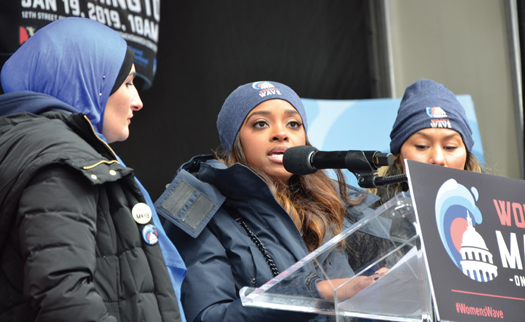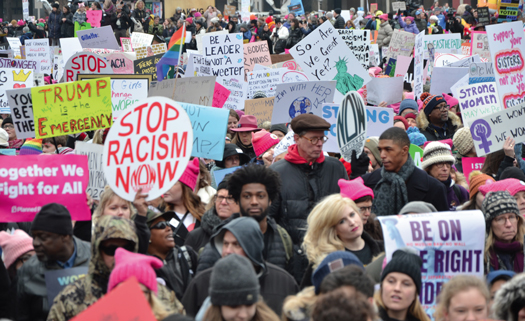Women’s March pivots to advocacy and policy agenda
By Barrington M. Salmon -Contributing Writer- | Last updated: Jan 29, 2019 - 2:02:27 PMWhat's your opinion on this article?

Women’s March organizers Linda Sarsour, Tamika Mallory and Carmen Perez
|
WASHINGTON—There’s a connecting thread, a direct correlation between the activism and resistance of American women between 2017 and 2019.
Millions of women took to the streets in 2017 to express outrage at the selection of Donald J. Trump as president, to protest the steady and unrelenting attacks on women by reactionary elements of society. That march has gone down as the largest single-day demonstration in America history, illustrating the potential power and political impact women have while allowing to build community.
The next year, March organizers kicked off Power to the Polls, an aggressive nationwide plan to harness the burgeoning grassroots resistance to Mr. Trump and his far-right agenda and channel that energy into campaigns to elect progressive victories in the 2018 midterms.
During the 2019 Women’s March, co-chairs Linda Sarsour and Carmen Perez outlined a progressive policy agenda, released Jan. 18, that builds on gains of the record-breaking midterm elections, seeks to codify protections for a wide cross-section of women, lists legislative and policy priorities, and also works to ensure that elected officials on the federal, state and local level are held accountable.
The document declares: “The Women’s Agenda is a tangible declaration of how we will protect and defend our rights, safety, health and communities. Our agenda will serve as a work plan to Congress and will create the roadmap we will use to mobilize our constituents into 2020 and beyond.”
Ms. Sarsour said on Twitter days before the Jan. 19 march that the #WomensAgenda is the first ever intersectional federal policy platform by women and for all people. She said, “It’s a roadmap for our movement, a work plan for our electeds, and it’s everything we’re marching for on January 19, 2019.”
“In 2017, we made a declaration that the plan was to focus on winning back the House. Now we have marching orders to build a work plan,” said Ms. Sarsour, a veteran activist and Women’s March board director. “It’s not enough to elect people, progressives and women. It’s about what they do while they’re there and how are they going to stay accountable.”

Womens March 2019 organizers are focusing on moving their advocacy and public policy agenda. Tens of thousands turned out for a Jan 19 gathering in Washington, D.C. Photo: Hassan Muhammad
|
She said activists realize the need to plan and prepare for the 2020 presidential elections, and they’re focusing on voter registration, having conversations with various grassroots constituencies and “building platforms, creating excitement and momentum.”
“We’re putting out a policy agenda because there are tangible policies that can alleviate suffering, stop the bleeding just a little bit,” Ms. Sarsour said. “It was written by 50 women experts around the country and is broken down into 10 areas, including civil rights, civil liberties, reproductive rights, environmental justice and health care so that all communities are able to be seen. This is not an aspirational platform. There are specific things that Congress could pass right now. We believe that there’s bi-partisan support.”
Other policy priorities that are addressed in the 71-page document are violence against women, LGBTQIA+ rights, immigrant rights, universal health care, publicly available abortions and support for the Boycott, Divestment, Sanctions (BDS) movement. The BDS movement is a Palestinian-led movement inspired by the anti-apartheid movement that toppled the White minority regime in South Africa. Organizers say they are seeking freedom, justice and equality and urge pressure on Israel to comply with international law to ease the suffering of the Palestinian people.
Medea Benjamin, co-founder of CODEPINK! Women for Peace, said the Women’s March was a manifestation of the deep concern, anger and frustration women and their allies have as they’ve watched the Trump administration work tirelessly to erode the hard-earned gains made by women, Blacks and other vulnerable populations. Crucially, she said, the midterms proved to be a crucial turning point.
“We have a new scenario we’ve never had before,” said Ms. Benjamin. “Alexandria Ocasio Cortez spoke at both marches. She held up our banner which said ‘Feminism not militarism.’ This is a different genre of Congress and makes us feel we have a tremendous opportunity to be bold, to be different, such as supporting Medicare for all.”
Ms. Benjamin was referring to Democrats’ historic sweep in November 2018 as voter discontent and anger at the direction and policies of the Trump administration led to Dems taking control of the House of Representatives. This election shattered all types of records and the lower chamber now has 127 women with the most Black women, Latinas and other non-Whites in history. The new crop is decidedly progressive and the men and women came in prepared to do battle with the Republicans and an administration whose White nationalist agenda, nativist rhetoric, bigotry and misogyny has driven a wedge ever further between the Whites who support the president, the Republican Party and everybody else.
On Twitter after her victory, then-candidate Ayanna Pressley (D-MA) proclaimed: “When it comes to women of color candidates, folks don’t just talk about a glass ceiling—what they describe is a concrete one. We broke that concrete wide open.”
Several of the women who spoke to The Final Call said they believe marching has run its course and applauded the move toward representative politics and consideration of other tangible alternatives.
“There are fewer people each time around. All the energy that goes into marches should go into action on the ground,” said Ms. Benjamin, who has been on the frontlines of activism for 50 years. “They should be telling people to do ‘die-ins,’ take over buildings, do things in Congress. Enough of the marches.”
Nana Makini Niliwaambieni, an Akan Priest, educator and mother of five, agreed, but said other issues concern her.
“I have not been to any of the marches because I felt once again, that our issues as African women in America would be overshadowed,” she explained. “Few women have the same issues that we have as it relates to racism and the way it is imposed on us. There are other cultures and societies where women are discriminated against because of their color. But we have to deal with the issue of coloration and all that foolishness. We have all these issues.
“We would still get discriminated against and worst. Sometimes I’m torn because there may be outcomes that benefit us as a people. I guess the march is for those women who are clear and can be focused. They can represent us. If you go you have to ask, ‘Are you clear about your own mission and agenda?’ and not be coopted. It’s easy to get caught up in that kumbaya moment. It’s a conundrum of sorts.”
Nana Makini said it’s quite discouraging to see Black people still fighting the same battles as she and her contemporaries did when she was young.
“What’s unfortunate to me is that issues are not different from the way they were in the ‘60s and ‘70s,” she said. “We still have young people who’re at the forefront of marches. The issues are exactly the same. I listened to commercials and we’re still marching for the same damn things. Why is that?
“Walking and chanting and carrying signs is not enough. We should be talking about the Montgomery Bus Boycott.”
Nana Makini said the challenging circumstances and conditions that Blacks in America face demand vigorous responses and pushback, but so many people are afraid of losing their jobs, being jailed if they protest and being ostracized for their activism.
“Fear starts early. It’s really sad,” she said.
INSIDE STORIES AND REVIEWS
-
-
About Harriett ... and the Negro Hollywood Road Show
By Rabiah Muhammad, Guest Columnist » Full Story -
Skepticism greets Jay-Z, NFL talk of inspiring change
By Bryan 18X Crawford and Richard B. Muhammad The Final Call Newspaper @TheFinalCall » Full Story -
The painful problem of Black girls and suicide
By Charlene Muhammad -National Correspondent- » Full Story -
Exploitation of Innocence - Report: Perceptions, policies hurting Black girls
By Charlene Muhammad -National Correspondent- » Full Story -
Big Ballin: Big ideas fuel a father’s Big Baller Brand and brash business sense
By Bryan Crawford -Contributing Writer- » Full Story






 Click Here Stay Connected!
Click Here Stay Connected!








